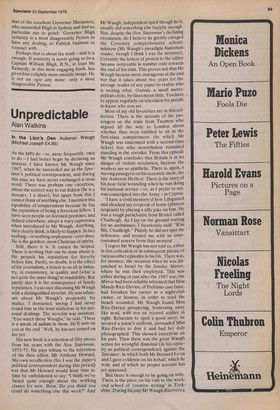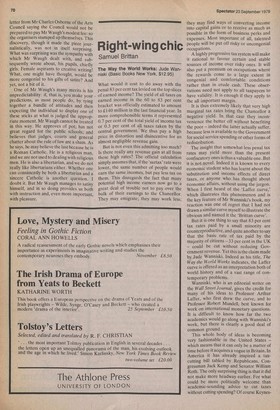Unpredictable
Alan Watkins
In the Lion's _Den Auberon Waugh (Michael Joseph £4.95) As the MPs do —or, more frequently, omit to do — I had better begin by declaring an interest. I have known Mr Waugh since 1967, when he succeeded me as the Spectator's political correspondent, and during this time we have 'never exchanged a cross word. There was perhaps one exception, about the correct way to cut Stilton (he is a scooper, I a slicer), but apart from this I cannot think of anything else. I mention this equability of temperament because he has the reputation of being a ferocious fellow. I have seen people on licensed premises, and indeed elsewhere, adopt a wary expression when introduced to Mr Waugh. Anything, they clearly think, is likely to happen. In fact nothing—or nothing unpleasant—ever does. He is the gentlest, most Christian of spirits.
Still, there it is. It cannot be helped. There is nothing that can be done about it. He propels his reputation for ferocity before him. Partly, no doubt, it is the effect of his journalism, a lesson to us all in industry, in consistency, in quality and (what is not quite the same thing) in readability. But partly also it is the consequence of family reputation. I was once discussing Mr Waugh with a distinguished novelist. He was adamant about Mr Waugh's propensity for malice. I demurred, saying I had never found him in the least malicious in his personal dealings. The novelist was insistent. 'You watch those Waughs,' he said. 'There is a streak of sadism in them. He'll turn on you in the end.' Well, he has not turned on me yet.
His new book is a selection of fifty pieces from his years with the New Statesman, 1973-75. He pays tribute to the toleration of the then editor, Mr Anthony Howard. My own recollection (for I was the paper's political correspondent during this period) was that Mr Howard would from time to time be emboldened to say.. 'I think we've heard quite enough about the working classes for now, Bron. Do you think you could do something else this week?' And Mr Waugh, independent spirit though he is, usually did something else happily enough. Nor, despite the New Statesman's declining circulation, do I believe he greatly enraged the Coventry comprehensive schoolmistress (Mr Waugh's paradigm Statesman reader, though I think I was the inventor). Certainly the letters of protest to the editor became noticeable in number only towards the end of his stint. This proves not that Mr Waugh became more outrageous at the end but that it takes about two years for the average reader of any paper to realise who is writing what. Outside a small metropolitan circle, by-lines mean little. You have to appear regularly on television for people to know who you are. Most of my old favourites are in this collection. There is the account of the passengers on the train from Taunton who argued all the way to London about whether they were entitled to sit in the first-class compartment (in which Mr Waugh was ensconsed with a second-class ticket) but who nevertheless remained standing in the corridor. From this episode Mr Waugh concludes that Britain is in no danger of violent revolution, because the workers are so apathetic. There is, again, a moving panegyric on his eccentric uncle, the late Auberon Herbert. There is the story of his near-fatal wounding when he was doing his national service — or, as I prefer to say, was conscripted into the Army — in Cyprus: 'I have a vivid memory of how I disgusted and shocked my corporal of horse (platoon sergeant) by playing a silly joke on him. He was a tough parachutist from Bristol called Chudleigh. As I lay on the ground waiting for an ambulance, I facetiously said; "Kiss Me, Chudleigh." Plainly he did not spot the reference, and treated me with an unaccustomed reserve from that moment . .
I regret Mr Waugh has not told us, either in this collection or in subsequent pieces, of various other episodes in his life. There was, for instance, the occasion when he was dispatched to Israel by the Sunday Mirror, where he was then employed. This was either during or just after the 1967 war; the Mirror had been reliably informed that Miss Mandy Rice-Davies, of Profumo case fame, had forsaken her ,career as a night-club owner, or hostess, in order to tend the Israeli wounded. Mr Waugh found Miss Rice-Davies prospering, hostessing away like mad, with not an injured soldier in sight. Reluctant to spoil a good story, he secured a nurse's uniform, persuaded Miss Rice-Davies to don it and had her duly photographed. This showed enterprise on his part. Then there was the great Waugh action for wrongful dismissal (in his capacity as political correspondent) against the Spectator, in which both Mr Bernard Levin and I gave evidence on his behalf, which he won, and of which no proper account has yet appeared.
But there is enough to be going on with. There is the piece on his visit to the weekend school of 'creative writing' in Yorkshire. During his stay Mr Waugh discovers a letter from Mr Charles Osborne of the Arts Council saying the Council would not be prepared to pay Mr Waugh's modest fee: so the organisers stumped up themselves. This discovery, though it made the piece journalistically, was not in itself surprising. What was surprising was the sympathy with which Mr Waugh dealt with, and subsequently wrote about, his pupils, chiefly girls. Female aspirants to creative writing! What, one might have thought, would be more congenial to his gifts of satire? And yet, not a bit of it.
One of Mr Waugh's many merits is his unpredictability: if, that is, you make your predictions, as most people do, by tying together a bundle of attitudes and then expecting the individual to display one of these sticks at what is judged the appropriate moment. Mr Waugh cannot be treated in this way. He approves of pot; has not great regard for the public schools; and believes that judges, courts and general chatter about the rule of law are a sham. As he says, he may believe the last because he is a Roman Catholic. He is a religious man, and we are not used to dealing with religious men. He is also a libertarian, and we do not really like libertarians either. Whether one can consistently be both a libertarian and a sincere Catholic is another question. I doubt it. But Mr Waugh manages to satisy himself, and in so doing provides us both with instruction and, even more important, with pleasure.



































































































 Previous page
Previous page